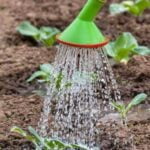When it comes to keeping our vegetable gardens free from unwanted weeds and grass, many gardeners turn to weed killers. However, the use of such products in a vegetable garden raises concerns about the safety of the produce. In this article, we will explore the use of Spectracide Weed Grass Killer in vegetable gardens and whether it is a safe option for maintaining a healthy garden.
We will begin by delving into what Spectracide Weed Grass Killer is and how effective it is at eliminating weeds and grass from your vegetable garden. We will also discuss the potential risks associated with using this product, as well as safety precautions that should be taken when applying it. Additionally, we will explore alternative natural and organic methods for controlling weeds in your vegetable garden.
As an essential part of maintaining a healthy vegetable garden, it’s important to understand the potential impact of using weed killers like Spectracide on the environment. Throughout this article, we will provide valuable insights and tips for using weed killers in your vegetable garden while ensuring the safety of your produce.
What Is Spectracide Weed Grass Killer
Spectracide Weed Grass Killer is a popular herbicide used to control unwanted vegetation in gardens and landscapes. It is specially formulated to target and eliminate various types of weeds and grasses, making it a convenient solution for gardeners dealing with persistent plant growth. The product contains a powerful active ingredient called glyphosate, which works by disrupting the growth process of plants upon contact.
How Does Spectracide Work?
Glyphosate, the active ingredient in Spectracide Weed Grass Killer, is absorbed through the foliage and transported to the roots of the targeted plants. Once there, it inhibits an enzyme that is essential for plant growth, ultimately leading to the death of the weeds and grasses. This mode of action makes Spectracide an effective and fast-acting solution for controlling unwanted vegetation in vegetable gardens.
Effectiveness
When used according to the manufacturer’s instructions, Spectracide Weed Grass Killer has been proven to effectively eliminate a wide range of common weeds and grasses. Its fast-acting formula provides visible results within hours of application, allowing gardeners to quickly regain control over their vegetable gardens. However, it is important to note that while Spectracide is effective at killing unwanted vegetation, it can also pose risks if not used properly.
Considerations Before Use
Before deciding to use Spectracide Weed Grass Killer in your vegetable garden, it’s crucial to carefully consider whether the benefits outweigh the potential risks associated with its use. While it can effectively control weeds and grasses, gardeners must weigh these benefits against any potential harm it may cause to their vegetables or to the environment. It’s also important to take into account alternative weed control methods that may be safer for your vegetable garden.
The Potential Risks
Spectracide Weed Grass Killer contains chemicals that have the potential to harm not only unwanted plants but also the surrounding environment, including your vegetable garden. One of the main active ingredients in Spectracide is glyphosate, which has been linked to health and environmental concerns.
Studies have shown that glyphosate exposure may be associated with an increased risk of certain cancers and other health issues. Additionally, using products containing glyphosate can lead to soil contamination and harm beneficial insects, such as bees.
Another potential risk of using Spectracide Weed Grass Killer in vegetable gardens is the possibility of chemical residues contaminating your crops. Even if you take precautions while applying the product, there is still a risk of it drifting onto your vegetables or being absorbed by their roots. Consuming vegetables that have been exposed to harmful chemicals can pose serious health risks to you and your family.
It’s important for gardeners to weigh the potential risks of using Spectracide against its benefits in weed control. While it may be effective at eliminating unwanted plants, the potential dangers associated with its use should not be overlooked. When considering whether to use Spectracide in your vegetable garden, it’s essential to carefully evaluate these risks and explore alternative methods for weed control that are safer for both your garden and the environment.
| Potential Risks | Discussion |
|---|---|
| Health Concerns | Glyphosate exposure linked to certain cancers and health issues |
| Environmental Impact | Potential harm to soil and beneficial insects |
| Residue Contamination | Risk of chemical residues ending up on crops |
Safety Precautions
Spectracide Weed Grass Killer is a commonly used product for controlling unwanted vegetation in gardens, including vegetable gardens. While it can be effective in eliminating weeds, there are potential risks associated with its use, especially when it comes to the safety of vegetable plants and the health of individuals who consume them. Here are some important safety precautions, tips, and guidelines to consider when using Spectracide in a vegetable garden:
- Read and Follow Label Instructions: Before using Spectracide Weed Grass Killer, carefully read the product label and follow the instructions provided by the manufacturer. This includes information on application rates, timing, and safety precautions.
- Choose Appropriate Weather Conditions: Avoid applying Spectracide during windy conditions or when rain is expected. Ideally, choose a calm day with no wind in the forecast to minimize drift onto your vegetable plants.
- Use Protective Gear: When handling and applying Spectracide, wear appropriate protective gear such as gloves, long-sleeved shirts, long pants, closed-toe shoes, and eye protection to prevent skin contact and inhalation.
It’s also essential to consider the proximity of your vegetable garden to other areas where people or pets may come into contact with treated vegetation. Keeping these safety precautions in mind can help minimize potential risks associated with using Spectracide Weed Grass Killer in a vegetable garden. By following these guidelines, you can work to ensure that your vegetables remain safe for consumption while effectively managing weed growth in your garden.
Remember that while these safety precautions are important for minimizing immediate risks to human health and vegetation within your garden, it’s also crucial to consider the broader environmental impact of using chemical-based weed killers like Spectracide. Balancing effectiveness with environmental responsibility is key when making decisions about weed control methods in a vegetable garden.
Alternative Methods
When it comes to maintaining a healthy vegetable garden, keeping weeds at bay is crucial. While products like Spectracide Weed Grass Killer may be effective in eliminating unwanted plants, some gardeners may have concerns about the potential risks associated with using chemical weed killers in their vegetable gardens. Fortunately, there are natural and organic alternatives that can help control weeds without posing a risk to your vegetables or the environment.
Consider trying the following natural and organic weed control methods in your vegetable garden:
- Mulching: Applying a layer of organic mulch, such as wood chips or straw, around your vegetable plants can help suppress weed growth by blocking sunlight and preventing weed seeds from germinating.
- Hand Weeding: While it may be more labor-intensive, periodically hand-pulling weeds from your vegetable garden can be an effective way to keep them under control without the use of chemicals.
- Vinegar Solution: A mixture of household vinegar and water can be used as a non-toxic alternative to chemical herbicides. Simply spray the solution directly onto weeds to kill them.
Using natural and organic weed control methods not only helps protect your vegetables from potential harm but also promotes a healthier and more sustainable gardening practice. By reducing the use of chemical pesticides in your vegetable garden, you can create a safer environment for both your plants and the surrounding ecosystem. When considering how to manage weeds in your garden, exploring these alternative methods can provide effective solutions while minimizing potential risks.
Tips for Protecting Your Vegetables
Using Spectracide Weed Grass Killer in a vegetable garden can be a cause for concern, as the chemicals in the product have the potential to harm your vegetables. However, there are ways to protect your vegetables and ensure their safety while using this weed killer.
One of the most important things you can do is to carefully follow the instructions on the product label. This includes applying the product at the right time of day and under the correct weather conditions.
Another tip for protecting your vegetables is to use a shield or barrier around them when applying Spectracide Weed Grass Killer. This can help prevent any overspray or drift from coming into contact with your plants. Additionally, it’s important to avoid using Spectracide near sensitive plants and to apply it only to areas where weeds are actively growing.
In addition to these precautions, it’s advised to pay close attention to the waiting period after using Spectracide Weed Grass Killer before harvesting your vegetables. This waiting period may vary depending on the specific product, so be sure to check the label for guidance. By taking these steps, you can minimize the risk of harm to your vegetables while using this weed killer.
| Tips for Protecting Your Vegetables | How to Ensure That Your Vegetables Remain Safe While Using Spectracide |
|---|---|
| Follow product label instructions | Applying at the right time and under correct weather conditions |
| Use shield or barrier | Preventing overspray or drift from coming into contact with plants |
| Minimize risk of harm | Paying attention to waiting period before harvesting vegetables |
Environmental Impact
When considering the use of Spectracide Weed Grass Killer in your vegetable garden, it is important to also take into account the potential impact on the environment. The chemicals in weed killers can have far-reaching effects beyond just eliminating unwanted plants, and it’s crucial to understand these implications before deciding to use such products.
Contamination of Soil and Water
One of the primary concerns with using Spectracide Weed Grass Killer in a vegetable garden is the potential for soil and water contamination. When applied to the soil, the chemicals in the product can seep into the ground and affect not only the targeted weeds but also other plants and organisms living in the soil. Moreover, when it rains, these chemicals can be washed away and enter nearby bodies of water, posing a threat to aquatic life.
Impact on Beneficial Insects
Another aspect to consider is the impact of weed killers on beneficial insects. Many insects play a vital role in pollinating plants and controlling pest populations in gardens. However, the use of chemicals like Spectracide can harm or even eliminate these beneficial insects, disrupting the delicate balance of the garden ecosystem.
Long-Term Effects
The long-term effects of using Spectracide Weed Grass Killer on your garden’s environment cannot be understated. Continuous use of such chemical products can lead to decreased biodiversity, reduced soil fertility, and an overall decline in environmental health. It is important to weigh these potential consequences against the short-term benefits of eliminating weeds before deciding whether or not to use Spectracide in your vegetable garden.
Conclusion
In conclusion, it is important to weigh the potential risks and benefits of using Spectracide Weed Grass Killer in vegetable gardens. While the product may be effective at controlling unwanted weeds and grass, it also poses potential dangers to both human health and the environment. It is crucial for gardeners to consider alternative natural and organic weed control methods, as well as take necessary safety precautions when using chemical weed killers like Spectracide.
After exploring the potential risks and safety precautions associated with Spectracide, it is recommended that gardeners opt for natural and organic weed control methods in their vegetable gardens. These methods not only minimize the risk of harmful exposure to chemicals but also contribute to a healthier and more sustainable gardening practice. By utilizing techniques such as mulching, hand weeding, and using natural herbicides like vinegar or boiling water, gardeners can effectively manage weeds while protecting their vegetables from harm.
Frequently Asked Questions
What Weed Killer Is Safe to Use in a Vegetable Garden?
When it comes to using weed killer in a vegetable garden, it is important to choose a product that is labeled as safe for use around edible plants. Look for herbicides that are specifically formulated for vegetable gardens and follow the instructions carefully to ensure the safety of your crops.
How Do I Kill Weeds in My Garden Without Killing Vegetables?
Killing weeds in a garden without harming vegetables can be achieved through various methods. One option is hand-pulling weeds to prevent damage to the surrounding vegetables.
Another method is to apply mulch or landscape fabric to smother the weeds while allowing water and air to reach the soil. Additionally, using natural weed killers such as vinegar or boiling water can be effective without posing a risk to vegetables.
How Long After Using Weed Killer Can I Plant Vegetables?
The timing of planting vegetables after using weed killer depends on the specific product used and its residual effects. It is important to carefully read and follow the instructions on the herbicide label, which should provide information on how long you should wait before planting vegetables after application.
In general, it’s best to err on the side of caution and wait at least several weeks before planting to ensure that any residual herbicide does not affect your vegetable crops.

If you’re looking to get into vegetable gardening, or are just looking for some tips on how to make your current garden better, then you’ve come to the right place! My name is Ethel and I have been gardening for years. In this blog, I’m going to share with you some of my best tips on how to create a successful vegetable garden.





